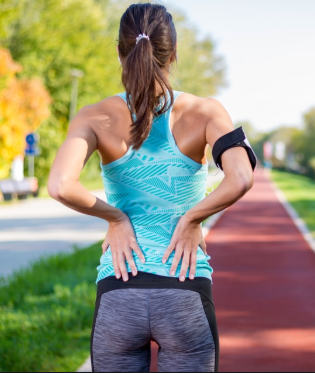I’ve had a number of teammates ask me why I don’t stretch before I skate. It’s a relatively complicated answer, but the main reason is to avoid injury. Let me explain:
Read MoreIt’s a common complaint I hear; my knees pop when I squat or my hip snaps. People often seem concerned about this, but generally speaking, this is considered normal.There are 3 typical reasons joints make sound: 1. Tendons, 2. Arthritis, 3. Gas bubbles.
Read MoreYour body can produce energy from multiple sources, the two most common being carbs and fats. If you are able to easily switch between the two sources without crashing, you are metabolically flexible. If, for years, you’ve been on a high carbohydrate diet, chances are you are not metabolically flexible.
Read MoreThis is an area of the body that is not often associated with pain when running, but for those that experience it, it can be a confusing nuisance. Usually the underlying problem stems from stiffness in the thoracic spine, or mid to upper back. This most often occurs with anyone who sits at a desk for work.
Read MoreOne of the more frequent complaints I hear from runners is back pain after a run. There may be many sources of this pain, but the first thing I’ll assess are the hip flexors.
Read MoreWhen you dig for dirt, you find dirt. This is how it is with imaging. Stenosis, spondylosis, degenerative disc disease, degenerative joint disease, schmorl’s nodes, foraminal narrowing, osteophyte formation; these are all scary words. Here’s the thing, they’re all normal. They are just words for aging.
Read MoreWear and tear has been the culprit for knee OA (osteoarthritis) for decades. This is now being challenged and is a controversial topic in the physiotherapy world. So instead of wear and tear, I’m proposing, “S.A.D. and Poor”. S.A.D. meaning the “Standard American Diet”. And Poor meaning poor movement quality and quantity.
Read MoreDoes your shoulder blade pop or snap when reaching overhead? Snapping scapula syndrome is a somewhat rare condition that typically affects overhead athletes. It is a snapping or grinding that can be located between the shoulder blade and the rib cage.
Read MoreThe TFL, or tensor fascia latae is a troublesome little muscle. It sits on the top and front portion of the pelvis. It attaches to the deep fascia of the leg.
Read MoreInflammation can be either good or bad for you, depending on the type of inflammation. First, we have to understand what inflammation is. It is the body’s normal response to injury or infection, and is a crucial step of the healing process.
Read MoreThe scapula has a very important role in shoulder function. There are several planes of motion that the scapula can move within. One plane in particular can become problematic; anterior tipping.
Read MoreHumans are the only animal on the planet that intentionally deprive themselves of sleep. Increasingly, our demands of work and the stigma of laziness for those who sleep in, have led to an overall decrease in total sleep across the population in industrialized countries. Our bodies are not equipped to deal with a lack of sleep and a cascade of negative events occur without rest. Lack of sleep can disrupt both mind and body and the consequences can be devastating.
Read MoreAnterior ankle impingement is an umbrella term that refers to pain in the front of the ankle when dorsiflexing the foot, particularly in load bearing.
Read MorePosterior ankle impingement syndrome (PAIS) is a term that describes pain in the back of the ankle when plantar flexing maximally, and sometimes when dorsiflexing. There are several reasons this can happen and can be a result of a bony process, unfused ossicles (small bones), or soft tissue (muscle/tendon/ligament/capsule).
Read MoreYou are on a cruise ship in your room and your stomach starts to rumble. Or maybe you are in a car reading a book in the back seat and get nauseated. Why does this happen? We are not 100% sure but it may be due to what is called the “sensory conflict theory” or “neural mismatch”.
Read More







